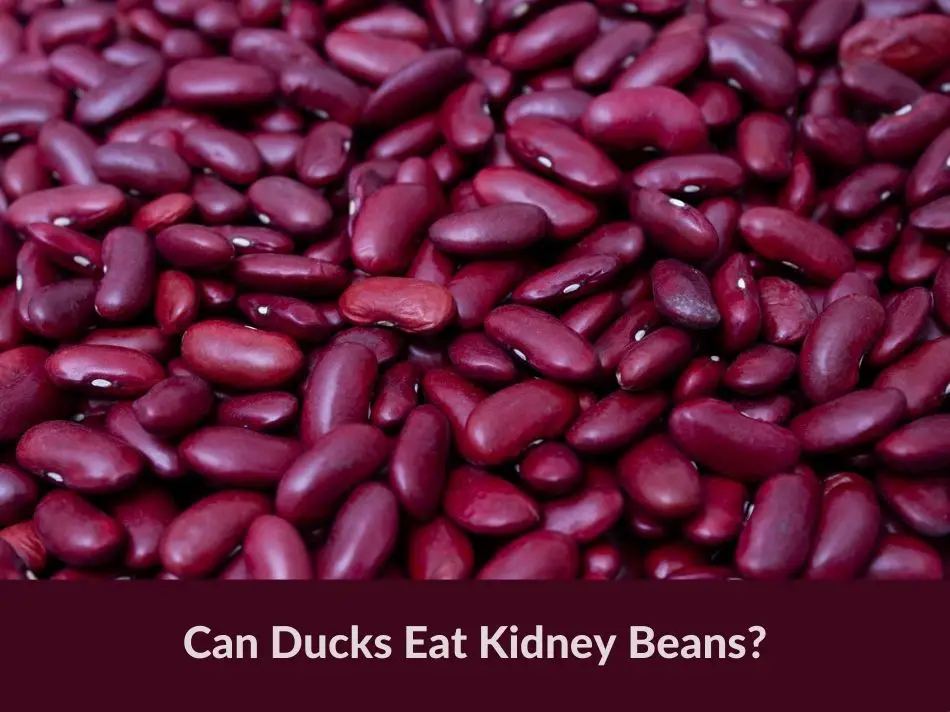In their natural habitats, ducks maintain a varied diet, foraging for aquatic plants, insects, small fish, and even grains. This omnivorous diet provides them with a diverse array of nutrients, vital for their health and vitality. But, can ducks eat kidney beans?
In moderation and with proper preparation, ducks can consume kidney beans. However, it’s essential to ensure the beans are thoroughly cooked. Raw kidney beans contain a toxin called lectin, which can be harmful to ducks. Cooking effectively neutralizes this toxin, making the beans safe for consumption.
In this article, we dive into the world of ducks and their dietary preferences, specifically focusing on kidney beans. Discover how often they can be fed, the potential benefits, and the proper way to serve them.
How Often Can I Feed My Ducks Kidney Beans?
Kidney beans can be an occasional treat for your ducks, making up no more than 10% of their total diet. As caretakers, offering them once or twice a week is enough. Remember, their primary diet should consist of waterfowl pellets, grains, and natural foraging.
Can Ducklings Eat Kidney Beans?
For the little ones, it’s best to tread with caution. Ducklings are still developing, and their digestive systems are more sensitive. If you’re keen on introducing kidney beans, ensure they are well-cooked, mashed to avoid choking hazards, and offered in very tiny amounts. Monitor the ducklings for any adverse reactions.
Kidney Beans Nutritional Value
Below is the nutritional value of 100 grams of kidney beans.
- Calories: 127
- Protein: 8.7 grams
- Carbohydrates: 22.8 grams
- Fiber: 6.4 grams
It also contains several vitamins and minerals as listed below.
- Molybdenum
- Folate
- Iron
- Copper
- Manganese
- Potassium
- Vitamin K1
Are Kidney Beans Healthy for Ducks?
Kidney beans come packed with protein, fiber, and various vitamins and minerals beneficial for ducks. The folate, iron, and manganese content can aid in feather health, energy metabolism, and bone structure.
However, due to the potential risks associated with raw beans and overconsumption, it’s imperative to ensure they’re served correctly and in moderation.
- Molybdenum: Molybdenum assists in metabolic processes and aids in the detoxification of certain environmental toxins, essential for maintaining a duck’s overall health.
- Folate (Vitamin B9): Folate plays a crucial role in DNA synthesis and cell growth, ensuring the healthy growth and maintenance of ducks.
- Iron: Essential for the production of hemoglobin, iron ensures efficient oxygen transport throughout a duck’s body, keeping them energetic and active.
- Copper: Copper is vital for the formation of red blood cells and aids in maintaining the vibrant coloration of a duck’s feathers.
- Manganese: This mineral is pivotal for proper bone formation and supports various enzymatic reactions, ensuring ducks have a strong skeletal structure and efficient metabolism.
- Potassium: Potassium aids in maintaining muscle function and fluid balance in ducks, essential for their active lifestyles in both water and on land.
- Vitamin K1: Key for blood clotting, Vitamin K1 ensures that minor injuries do not lead to excessive blood loss and also supports bone health.
How To Feed Kidney Beans To Ducks
- Preparation is Key: Always cook the kidney beans thoroughly to neutralize any harmful toxins.
- Serve in Moderation: Remember, treats should only be a small part of a duck’s diet. Portion out a small amount of beans and mix them with their regular food.
- Monitor After Feeding: Especially the first time, watch for any signs of digestive discomfort or changes in behavior.
- Water: Always ensure ducks have access to clean water when feeding, especially with dry foods. This aids digestion and helps prevent choking.
More Vegetables Ducks Can Eat
Ducks are incredibly versatile eaters, often enjoying a range of nutritious treats from nature. When considering vegetables, it’s remarkable how many are suitable for our feathered friends.
Conclusion
Kidney beans can be a delightful treat for ducks when prepared and served correctly. Whether you’re a dedicated caretaker or a park visitor hoping to offer a unique snack, it’s essential to prioritize the health and safety of our feathery friends.
Disclaimer: The information in this article is for informational purposes only. I'm not an expert or a veterinarian.


